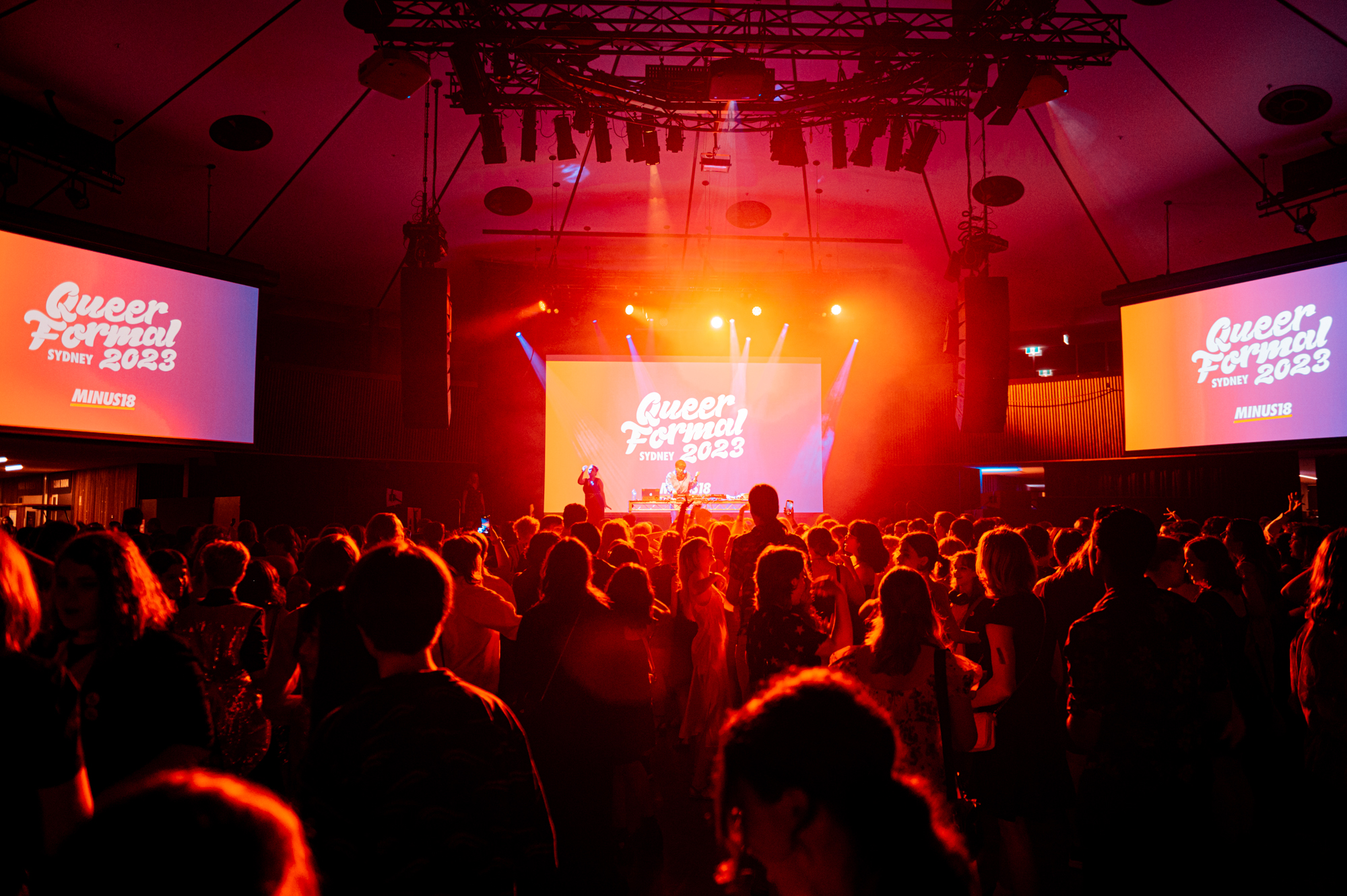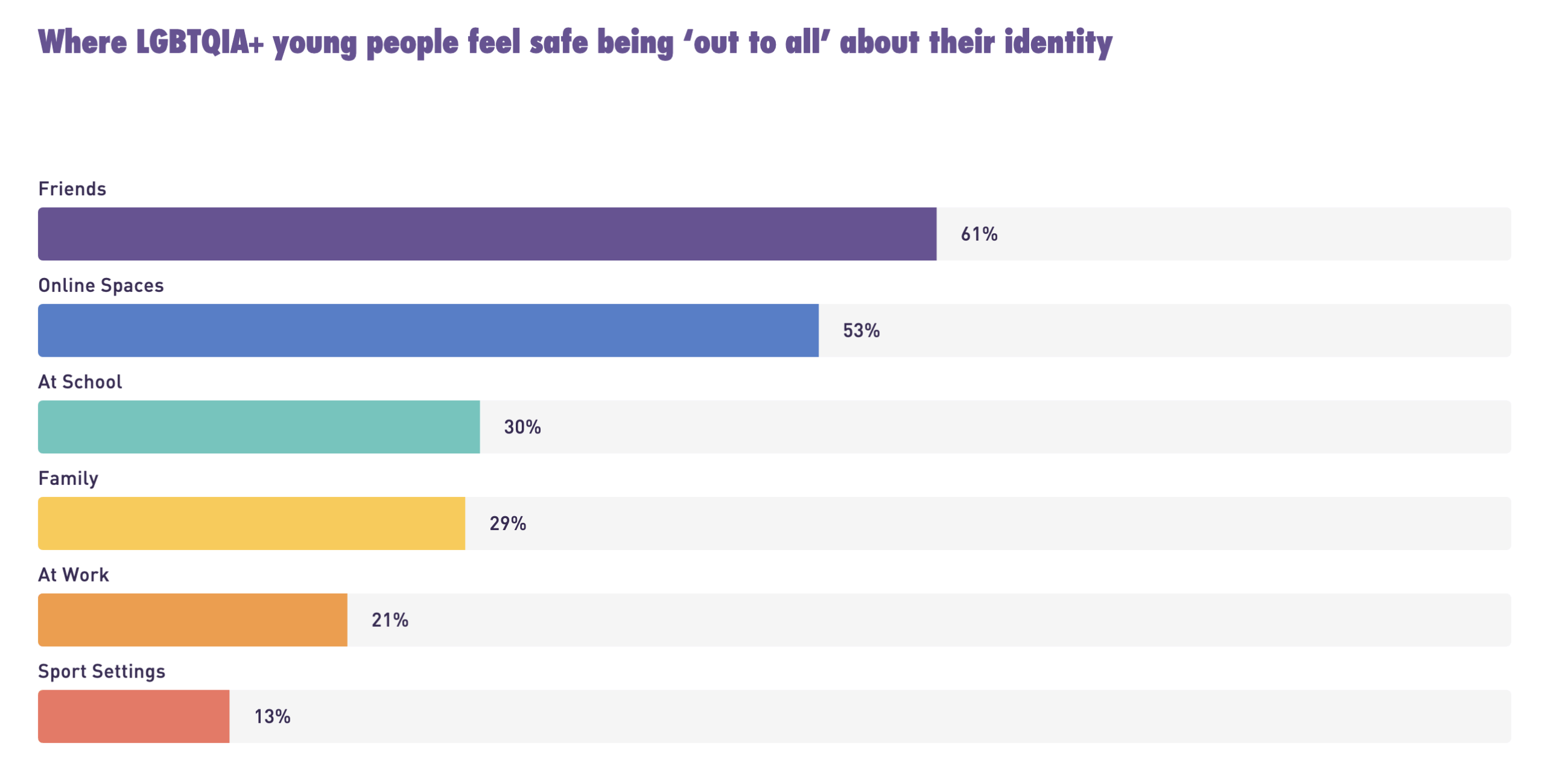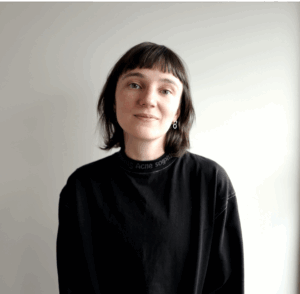DJ Gay Dad brings the night to a crescendo as Freddie Mercury’s voice is joined by almost a thousand queer young people belting out Bohemian Rhapsody to close this year’s Queer Formal – the biggest and brightest of Minus18’s events for young LGBTQIA+ folk.
I tear up witnessing this vibrant oasis of queer joy, while somewhere inside remembering my own very isolated teenage years. It’s hard to imagine the difference a space like this could have made to my life. There is no better feeling than seeing the impact first-hand as one young person rushes up to my colleague with an urgent message – “I just need to tell someone that this was the best night of my life!”.
House lights go up, and the young people begin to leave the space.
But outside of this oasis, what world do these young queer folk head out into?

Here at Minus18, Australia’s largest charity for LGBTQIA+ youth, we recently conducted a national survey, Queer Youth Now, bringing together the voices of 2,724 queer young people, to gain a deeper understanding of the lives and experiences of young LGBTQIA+ folk in Australia.
This survey shed light on young people’s experiences of connection and pride, but also the heavy reality of challenges that exist each day, and the sobering fact that LGBTQIA+ discrimination is an ongoing reality for queer young people.
Queer Youth Now revealed 89% of participants have experienced hate and harassment, and 55% said they have been excluded or discriminated against due to their queer identity. Notably, the workplace is a space young queer people report significant barriers.
Work is ranked by queer young people as an area in their lives where they report feeling significantly less safe to be “out”, with 79% of LGBTQIA+ young people reporting that they do not feel safe to be “out to everyone” at work. This was second only to sporting spaces, where homophobia and transphobia are well documented. This new data sits alongside data from AWEI that points to a negative trend over the last 5 years, indicating that each year fewer LGBTQIA+ folk are reporting being “out to everyone” at work.
In a socio-political climate where LGBTQIA+ folk are becoming political targets, and D&I initiatives are being challenged, it makes sense that LGBTQIA+ folk are feeling less safe. We can also consider data from Queer Youth Now, detailing the challenging experiences young people often move through when coming out at school, leading to a decision to not come out at work as a means of protection.

Reflecting on my own experiences in the workforce, I can absolutely empathise with a decision to not come out. Workplaces can be such a mix of people, with very differing levels of acceptance and understanding. I can recall many workplaces where I have felt varying levels of discomfort – I have been asked inappropriate questions, overheard hateful conversations, and had my rights debated openly. It can be hard to navigate and hard to hold, but support can and does make a huge difference.
So, what can be done to improve the lives of LGBTQIA+ young people in the workforce?
BE VISIBLE
A huge 87% of Queer Youth Now participants say seeing someone wearing rainbow or ally accessories makes them feel safer and more like they belong.
Moving through the world as a queer person, it is unfortunately not always a guarantee that a space will be a safe one. I know that when I walk into a space and see visible signs of allyship, I relax.
BE PROACTIVE
Don’t wait until you become aware of an LGBTQIA+ person in your workplace to make the changes that may need to be made to help that person feel safe and included. Get ahead of the game and make those changes now!
When I first began working with Minus18 my onboarding process was unlike any I had previously experienced. I was able to safely share pronouns, care was taken around legal names that may be different to chosen names, and I was introduced to gender affirmation leave – all steps any workplace can take! The difference this made immediately to my sense of confidence and comfort joining the team was immeasurable.
BE OPEN TO LEARNING
A massive 72% of Queer Youth Now participants simply wish their colleagues knew more about their identities to help them feel accepted – I have the privilege of working on Minus18’s education team facilitating exactly this kind of knowledge.
Minus18’s workshops offer a space to learn about LGBTQIA+ identities and experiences and offer practical tips on creating safer environments. When I reflect on my own challenges through my working life, so many of those challenges stem from simple misunderstandings. So, I spend my days having important conversations that build understanding, and urging folks to consider that even their smallest actions can have a life changing impact.
I very recently ran a workshop with an Australian Government organisation who invested in education for their team following one of their staff members coming out as trans, so the onus of educating people did not fall on the trans staff member themselves. The workshop was a buzzing and lively one – with staff jumping at every opportunity to learn and brainstorm inclusive strategies. It’s workshops like these that absolutely fill my cup. It is heart-warming to see so many workplaces reaching out to work together to create safer spaces.
Thinking of all the workshops, conversations, and moving moments with allies committed to making a better world for young folk to move into, I am heartened, grateful – and most importantly – optimistic.
Note: The author of this blog uses the acronym LGBTQIA+ in alignment with their own organisation and/or experience.
 Charlie Farmer (she/they) is an LGBTQIA+ Education Presenter at Minus18. With a background as a creative artist and audio engineer, teamed with a degree in Sociology/Psychology, Charlie has enjoyed a varied career bringing their belief in the transformative power of the arts into creative workshop facilitation, gallery education, and social change education initiatives across Naarm.
Charlie Farmer (she/they) is an LGBTQIA+ Education Presenter at Minus18. With a background as a creative artist and audio engineer, teamed with a degree in Sociology/Psychology, Charlie has enjoyed a varied career bringing their belief in the transformative power of the arts into creative workshop facilitation, gallery education, and social change education initiatives across Naarm.
As an Education Presenter, Charlie is dedicated to fostering enriching and accessible spaces for learning built on curiosity, compassion, and collaboration. Charlie’s facilitation style is grounded yet playful, bringing positivity, creative thinking and fun to each workshop. Outside of work Charlie enjoys composing music and collecting stringed instruments, tearing up the soccer field, or just getting cosy with her old dog, a fantasy show, and a hot cup of tea.
Additional resources
- Minus18’s website
- Trans Gender Victoria (TGV)’s resource library
- Pride in Diversity’s resources page
- How to Build LGBTQIA+ Inclusion at Work, IDAHOBIT
- A Guide to Using Pronouns at Work, IDAHOBIT
- Tips to be an LGBTQIA+ Ally, IDAHOBIT
DCA resources
- DCA’s LGBTIQ+ resource page
- Out At Work
- Intersections at Work
- Words at Work: Building LGBTIQ+ inclusion through the power of language
- Pride at work: DCA members share their celebrations
- Transgender Day of Visibility: Imagining the limits of discrimination, blog by Dr Eloise Brook, CEO of AusPATH
- The diversity of LGBTQ+ families and parental leave, blog by Ashley Scott, Executive Officer and Co-founder of Rainbow Families
- Mental Health Month: Addressing the stark reality of LGBTIQ+ mental health, blog by Terence Humphreys, Mental Health and Suicide Prevention Director at LGBTIQ+ Health Australia
- Beyond Binary for gender inclusive workplaces, event recording
- Case Study Conversation: Gender and Sexual Diversity at SSI, event recording
